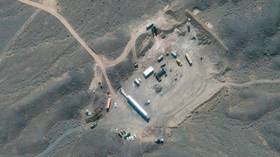Iran’s Foreign Ministry blames Israel for Natanz incident, calls it trap to derail sanctions talks in Vienna
12 Apr, 2021 07:59 / Updated 1 hour ago

The underground Iranian nuclear facility experienced a power outage on Sunday. An Iranian Foreign Ministry spokesman called the suspected Israeli sabotage “an act against humanity,” because the damage done to the plant could have caused a disaster.
“There was no contamination or injuries but it could cause a disaster. It could be considered as an act against humanity,” Saeed Khatibzadeh told a news conference on Monday.
ALSO ON RT.COMIran reports ‘NUCLEAR terrorism’ attack at Natanz facility – day after uranium enrichment beganForeign Minister Javad Zarif reportedly warned that Iran should not fall into “Israel’s trap” and compromise its negotiating position in Vienna, where Tehran and Washington are trying to find a way to salvage the 2015 nuclear deal.
Israeli officials “have clearly said that they will not allow progress to be made in lifting the sanctions, and now they think they are achieving their goal,” the minister said, as cited by Iranian media. “But Zionists will get their response in further nuclear progress.”
Zarif was referring to indirect talks between the US and Iran on how the two nations can return to full compliance with the Obama-era agreement known as the Joint Comprehensive Plan of Action (JCPOA). Under it, Iran agreed to restrict its nuclear program in exchange for relief of economic sanctions and business opportunities.
ALSO ON RT.COM‘Mossad behind cyber-attack’ on Natanz facility that Iran called ‘nuclear terrorism,’ Israeli media claimFormer US President Donald Trump followed the Israeli government’s example in branding the agreement “the worst deal ever made,” and withdrew from it completely in May 2018, instead imposing devastating sanctions against Iran. A year later, Iran started to gradually walk back on its part of the bargain to put pressure on the European signatories, which, Tehran said, failed to deliver on their promise to shield Iran from Washington’s attack.
The Biden administration said it wants to revive the JCPOA, but has refused to simply reverse Trump’s actions that went against it. The talks in Vienna, which are mediated by EU officials, are meant to overcome the impasse between the US and Iran. Both nations have publicly taken uncompromising stances in terms of who should act first and to what degree.
While Israel did not immediately comment on the incident at Natanz, the media in Israel and the US reported that according to sources, Mossad caused it through a cyberattack. The alleged attack happened a day after Iran celebrated National Nuclear Technology Day by launching new uranium enrichment centrifuges and reporting progress on the development of new, more advanced models. A cap on the volume and purity of enriched uranium that Iran can produce is a key part of the JCPOA.

0 Comments:
Post a Comment
Subscribe to Post Comments [Atom]
<< Home